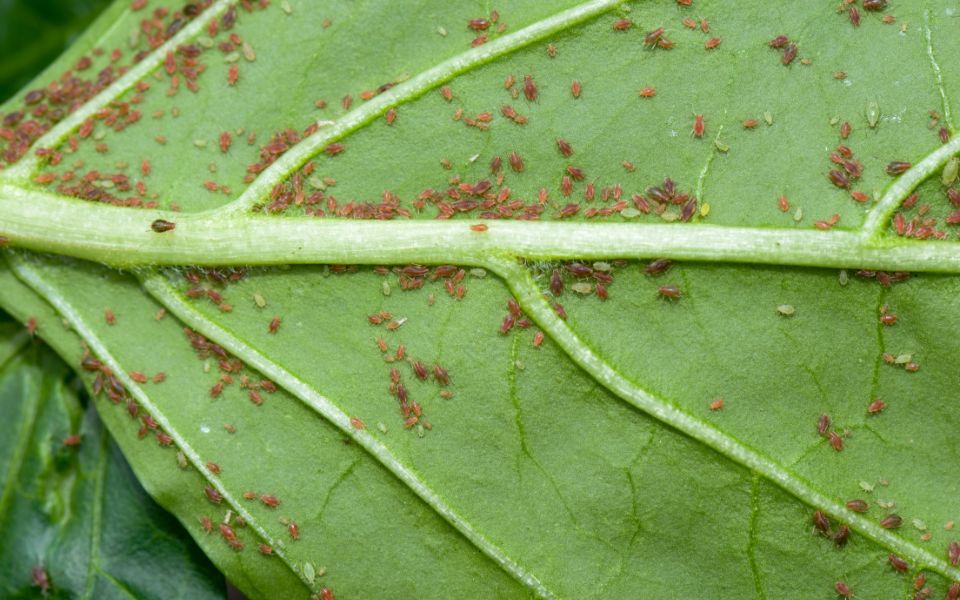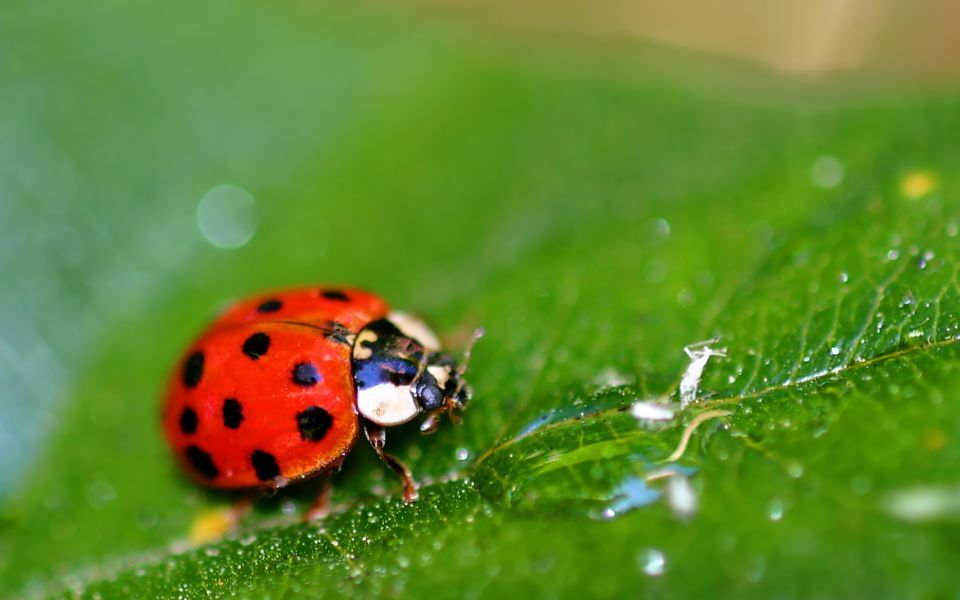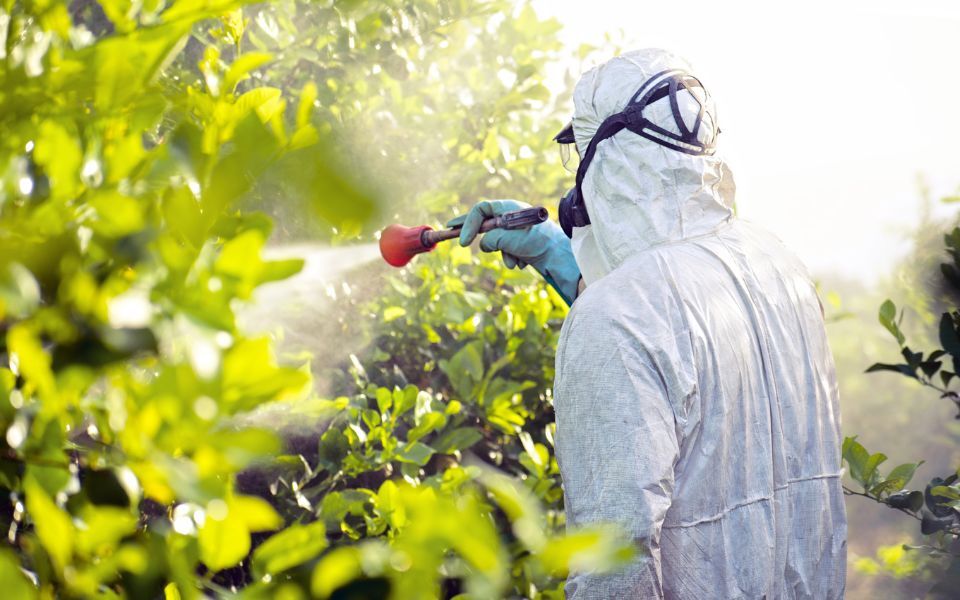
Professional cultivators and home gardeners struggle with a common problem: aphids. Almost every plant has one or more aphid species that occasionally feed on it. Many aphid species are difficult to distinguish from one another; however, management of most aphid species is similar. Chances are you've seen aphids on your plants and are asking yourself:
- What are aphids and how to identify them?;
- What damage can they cause to my plants?; and
- What is the best treatment plan?
Here's what you need to know about aphids.
What are Aphids and How to Identify Them
Aphids are small, soft-bodied, pear-shaped insects with long legs and antennae and may be green, yellow, brown, red, or black depending on the species and the plants they feed on. They cluster densely on tender new growth and the undersides of leaves to suck plant juices. Most species have a pair of tubelike structures called cornicles projecting backward out of the hind end of their body. These distinguish aphids from all other insects. Additionally, unlike leafhoppers, plant bugs, and certain other insects that might be confused with them, most aphids don't move rapidly when disturbed.

What Damage Can They Cause to My Plants?
Stunted Growth and Damage to Leaves
Plants often can withstand some aphid feeding with no adverse effect, but badly infested plants develop distorted growth and leaves may turn yellow or drop off. Aphids can also produce large quantities of a sticky exudate known as honeydew, which often turns black with the growth of a sooty mold fungus. Some aphid species inject a toxin into plants, which causes leaves to curl and further distorts growth.
Virus Transmission
Aphids may transmit viruses from plant to plant on certain vegetable and ornamental plants. Squash, cucumber, pumpkin, melon, bean, potato, lettuce, beet, chard, and bok choy are crops that often have aphid-transmitted viruses associated with them. These viruses are difficult to prevent because infection occurs even when aphid numbers are very low and transmissions occurs within a few minutes, while it takes much longer to kill aphids with traditional insecticides.



What are Common Treatments for Aphids?
Monitoring
Because each adult aphid can produce up to 80 offspring in only a week, aphid populations can increase with great speed. As a result, once your garden has an infestation, it becomes increasingly difficult to eradicate the problem completely. The best course of action is prevention.
Be sure to check your plants twice a week, especially during the following conditions:
- High-growth stage, which provide favorable new growth for aphids to feed on
- When temperatures are warm but not hot (65°-80°F), especially in late spring
- New evidence of natural enemies, such as lady beetles, lacewings, and syrphid fly larvae
Biological Control
Adding Beneficial Insects: Natural enemies are often used to control aphids, especially in gardens not sprayed with broad-spectrum pesticides (e.g., organophosphates, carbamates, and pyrethroids) that may kill beneficial species as well as pests. The most well known are lady beetles, lacewings, soldier beetles, and syrphid fly larvae.
Cultural Control
Pruning: When aphid populations are localized on a few curled leaves or new shoots, the best control may be to prune out these areas and dispose of them.
Avoid Excess Nitrogen: High levels of nitrogen fertilizer favor aphid reproduction so it's important to apply fertilizers in small portions throughout the season rather than all at once.
Water Spray: Another way to reduce aphid populations on sturdy plants is to knock off the insects with a strong spray of water. Most dislodged aphids won't be able to return to the plant, and their honeydew will be washed off as well.
Chemical Control
Once an infestation has become severe, many cultivators turn to oils and insecticides, some of which may be regulated in your country or state.
- Insecticidal soaps and oils (neem or canola): These products kill primarily by smothering the aphid, so thorough coverage of infested foliage is required. Such treatments only kill aphids present on the day they are sprayed, so applications may need to be repeated due their high reproduction capacity. Although safer than traditional insecticides, the lower efficacy may not be enough to control a severe outbreak.
- Traditional insecticides (malathion, permethrin, acephate): While these materials may kill higher numbers of aphids than soaps and oils, their use should be limited, because they may kill beneficial insects that provide long-term control of aphids and other pests. Additionally, they are associated with bee kills, environmental pollution, and employee safety hazards. Repeated applications of these materials may also result in resistance to the material.
A New Treatment Option: Terra Vera's Guardian (GRDN) Products
As commercial cultivators, Terra Vera team members had first-hand experience with aphid outbreaks and often had to face tradeoffs between cost, efficacy, safety, and sustainability. This inspired us to create a safer alternative made of food-grade ingredients: Guardian (GRDN). The newest product in our ELMNT blends, GRDN is made of Potassium Sorbate and Potassium Chloride and formulated to control soft-bodied pests and pathogens. When paired with our Thrive (THRV) Nutri Packs, we believe plants can maximize yields and express their traits to their fullest potential without the extra stress of pathogens and pests.
Grow Smart from the Start
Using Terra Vera's crop protection and nutrient solutions from start to finish increases your plant's ability to fight off environmental stress so that yield potential and quality are preserved. It can be sprayed on plants even through the late stages of bloom and post-harvest, making it a versatile solution for even the most sensitive genetics. The best part? You can generate Terra Vera solutions onsite with our systems so that you can rest easy knowing your plants are getting fed the freshest ingredients each time.